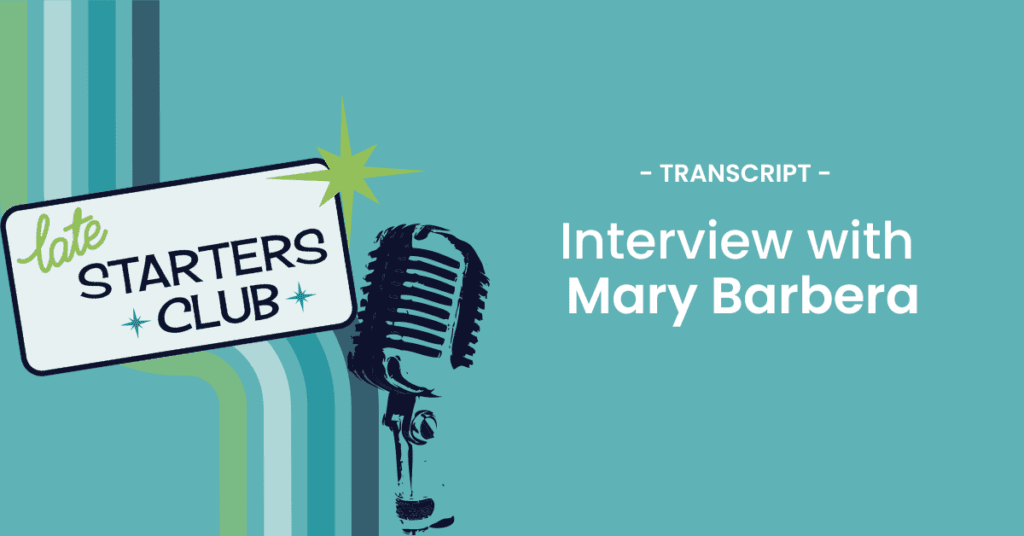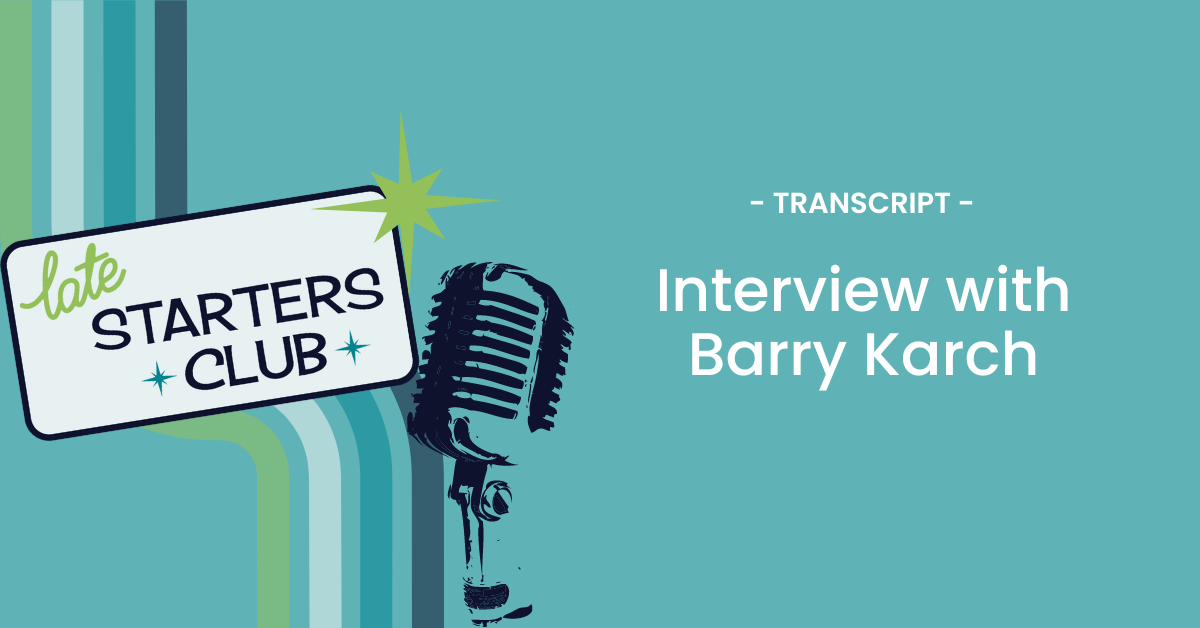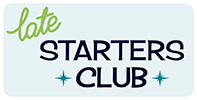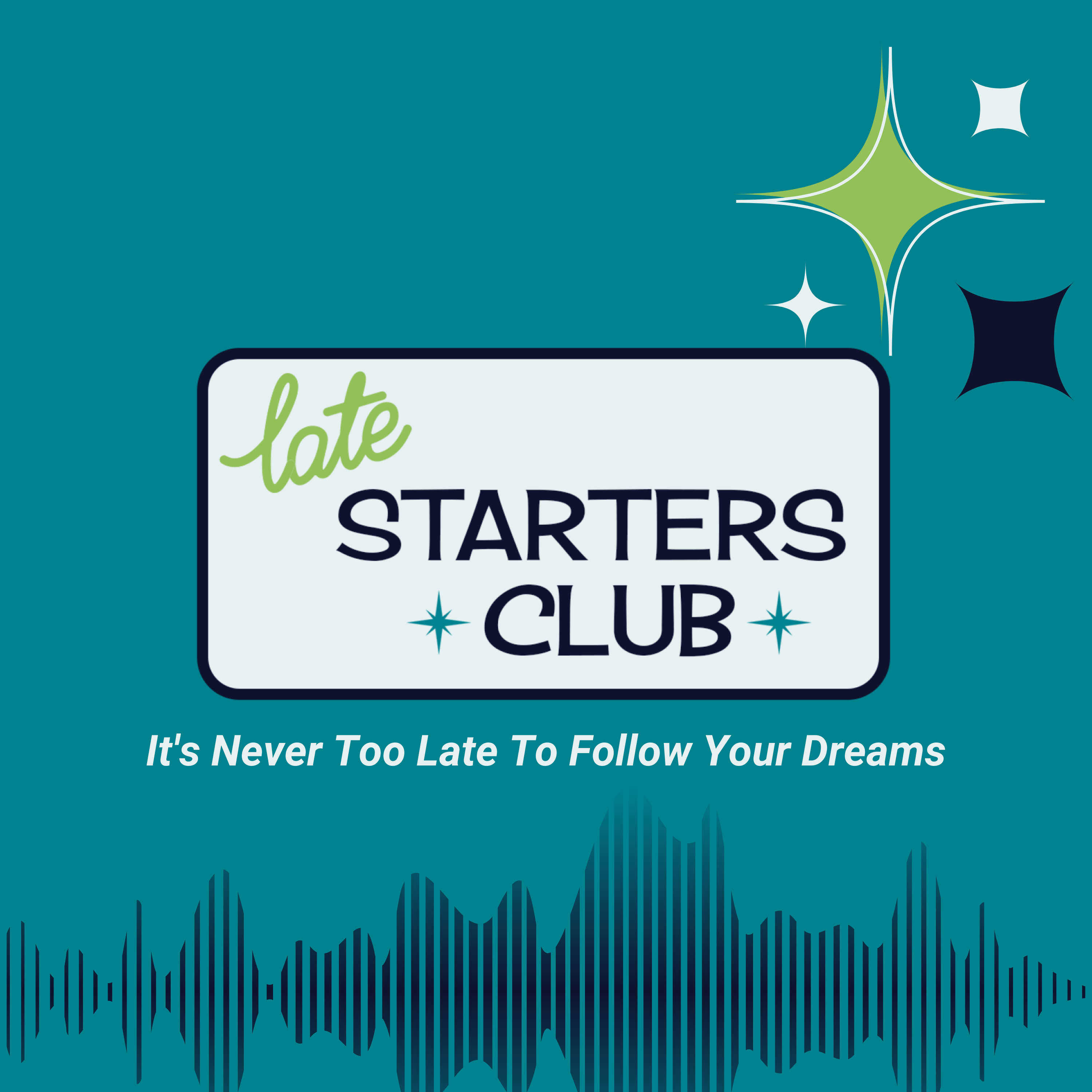Subscribe Apple | Google | Spotify | Stitcher | iHeart Living the Dream Overseas with Christine Gritmon Have you had a lifelong dream to live overseas and haven't made that happen yet? Maybe things have gotten in the way like family, jobs, life. My...
Ep119 Transcript: Interview with Mary Barbera

Andrea Vahl: What if you had a powerful mission to reach millions of people with a message? My guest today, Dr. Mary Barbera, has had an unconventional path to becoming an evangelist to help turn autism around. She went from nurse to occupational therapist to PhD to international speaker, author, podcaster, and course creator, and she has done most of this in her forties and fifties.
Tune into today’s episode and get inspired.
Hello Dreamers. Welcome to the Late Starters Club, giving you the inspiration mindset and tools you need to start something midlife and beyond. Remember, it’s never too late to follow your dreams.
Hello, late starters. It’s your host, Andrea Vahl and I am here with Dr. Mary Barbera. She is amazing, you guys. You are going to love her. She’s super inspirational. She has changed careers several times over the decades and started in the online marketing space in the autism world in 2015 at the age of 50.
Her website’s Marybarbera.com, and she does, I don’t even know how she does everything she does with her time. She’s got a podcast, she’s got books. She’s spoken all over the world. She is got courses, tons of courses. She is a master online marketer as well. That’s the thing that is just amazing about, about Dr. Barbera. So welcome, Mary.
Mary Barbera: Thank you, Andrea. It’s great to be here.
Andrea Vahl: Yeah, it’s I’m excited. We have so many things, so many ways we can, things we can go with this this interview. So I just want to start with a little bit of your story and how you got started in the autism world. It was for sure not by choice.
You, you got started and, and you have an amazing story about what you did about it. I love that too.
Mary Barbera: Yeah, so I say I fell, quote unquote into the autism world back in 1999 when my firstborn son Lucas, was diagnosed with autism one day before he was three. But I actually fell into the autism world.
After he was one, he started to regress, show signs of autism. I didn’t see it. I was pregnant with my second son. My husband, who’s a physician first mentioned the possibility of autism when Lucas was just 21 months of age. I told him I, he didn’t have it, even though I had no idea what it looked like in a toddler.
And that I never, ever wanted to hear the word autism again. So like a good husband, he didn’t bring it up for months or maybe a year later. And it was confusing because this is way before any social media. We were barely on aol, barely searching the web. And the rate of autism was one in 500 approximately.
Now it’s one in 36 with one in every six children having some kind of developmental delay or disorder. So now it’s super common. But back then I was very overwhelmed. I went into a deep state of denial for over a year. And then when Lucas was finally diagnosed the day before he was three, it was, it’s never too late.
But it certainly could have made a lot more progress had we got on it and started looking into it a lot sooner. So we wasted because of my denial, about 15 months, my husband first noticed the signs at 21 months, or he first brought it up. Lucas really didn’t get into good high quality treatment until 39 months.
Although he got speech therapy, he went to typical toddler preschool. It’s not like he sat in a closet. And his symptoms didn’t look that bad, but he is, he remains very impaired, needs 24/7 care. He’s turning 27 soon And in the process, once I found out it was autism and moderate severe autism and was felt more guilty, then I went from being a master’s prepared nurse.
I was a nurse manager and doing research in the nursing field and presenting in the nursing field. I went from that to founding the Autism Society in my county. And I also, went into litigation to get better services for Lucas. And in the process, my lawyer told me to become a behavior analyst. I was like, what’s that?
It was a new certification. So then I became a board certified behavior analyst, one of the first, thousand around the world. And then after that, a couple years later, people were coming to me like, tell me what to do. I have a child that just got diagnosed and I was like, I don’t have 40 hours to sit here and tell you what to do.
It’s all in my head. And then I wrote my first book in 2007 I think I was, I can’t do math on, on air especially. I think I was about 40 when I wrote my first book. And it really put me on the map. It’s in 17 languages. I traveled around the world speaking about autism. I worked for a big project through the Pennsylvania Public School system.
I was the lead behavior analyst for that. So I’ve moved, from nurse mom. Overwhelmed. Behavioral analyst advocate, author. And then in 2011, I decided in 2006, I went back for my PhD in leadership and. when I graduated in 2011, they said what are you going to do now?
And I’m, are you going to teach in college? And I’m like, no, I’m not teaching college. I’m going to try to get my message out online again. It was early. And it took me a few years finding different people, some people that your audience knows. Brenda Brouchard the Millionaire Messenger was one of the first books.
Amy Porterfield, her Webinars that Convert course, and then Jeff Walker, and that’s how I know you, Andrea. I went to the first Launch Con. I saw the competition. I was like, oh my gosh, there’s a thousand people here. There’s 10 people up on the stage. They all want a mastermind to Durango, to Jeff Walker’s Secret headquarters.
I was sitting in the audience going, I’m going to. I’m going to join and I’m going to be on that stage next year so I can go to a mastermind. Ended up winning the whole competition the following year. And became, an online marketer. And podcaster and all that stuff. So it is a very complicated tangled web and that’s why I love the name of your podcast, the Late Starters Club, because gone a re the days where you just become a nurse or an accountant, there’s no reason to stay in a field, especially as life throws different things your way.
Andrea Vahl: Yeah, exactly. It’s so rare, I think, these days, to stay not only in your narrow space, a lot of times people are making big leaps.
They realize something major changes or shifts or obviously, a health thing that just turns your life upside down and now all of a sudden you’re turned into an advocate with a huge mission of turning autism around and reaching millions of people. You didn’t go to a school for that back when you were 20,
Mary Barbera: nobody did.
No, that’s true. True mean nobody went to school. Maybe now they have programs on online marketing. But even if you go to school for marketing or business, you don’t learn this stuff. You don’t not learn how to produce a podcast and how to do Facebook ads and, it’s complicated and it keeps changing.
Andrea Vahl: And so you guys, if you are not getting this, Mary, is like the craziest self-starter you’ve ever seen, doing all this stuff and still caring for her family at the same time, which is amazing. So That’s one of the things that I find really amazing about you.
How have you balanced that? Not that there is, that balance word is such a fake word, but how have you managed getting your PhD while, getting your message to the masses and still taking care of your family? Do you have some great tips for people who struggling with some of this?
Mary Barbera: Over the years, have paid a lot of money to people to help me. Because my husband’s a physician. I have a master’s degree in nursing, but when I had my kids back to back I was a stay at home mom and I thought that I would go back and get a PhD in nursing and pick up on some of the research I was doing in the nursing field and present and that sort of thing.
So when autism came our way and I decided to become a behavior analyst, which took a lot of time, and then I decided to work in the field of ABA, and then I decided to write my book and eventually get my PhD. I mean all of that with not just Lucas, but also Spencer, who was 18 months younger.
We decided to hire au pairs, which are foreign nannies. One at a time. And we had six of them back to back years. And then the last one pivoted, stayed as an international student. Ended up moving in with a boyfriend, but she was still caring for us and caring for the kids. Mostly Lucas at that point. But had I not hired help like serious help, not just like a babysitter who, that’s the problem with hiring help, like hiring childcare people is, you know, I was tired of getting somebody and then they’d be like, oh, my boyfriend’s mom’s car broke down, so I need to take her.
It’s like, n obody has you as their top priority. I had to go to other countries to fly them in. To be like, okay, we’re your number one. And we also have a house with an in-law suite. Actually, this, this is one of the bedrooms I made of into a video studio. So we were set up for that pretty well. And people say, oh I don’t have the money for an au pair or whatever. And it’s surprisingly affordable if you have the right conditions. And are okay with people. Half world might get into my house, which is kinda scary. Yes. So you, yeah.
You know there are tradeoffs.
Andrea Vahl: Yep, yep. And the other thing, just to piggyback on that, investing in help, you’ve also been such a great investor in your business, but your business has always has been, and I don’t know, always been, but it has been very profitable. That’s another thing that I think is an amazing focus is that even though you’ve got this big mission, you still have to charge money.
People have to have this value exchange, and you have to have that profit center so that you can get your message out in a bigger way so you can invest in the tools and the ideas and the people to help you with your business.
Mary Barbera: I am not the most techie person you’re ever going to meet, and so I knew right away if it was going to rely on just me doing things, it was it was not going to spread very fast. And I think that’s one of the advantages of starting late. Is, you don’t have all the time in the world. And you really need to focus on what you’re good at. Plus, when I started my online business, I was also still working as a one-to-one consultant.
As a behavior analyst, and so I didn’t drop that like a hot potato. I started, my business. As I did the one-to-one coaching, and then eventually, a couple years later, dropped the one-to-one consulting locally. But I do have the advantage of being married to a physician. He’s, he’s actually an administration now, and he’s been for many years.
So in the beginning it was like, oh, Mary’s dabbling. Until I really started, building a video studio and even though I had traveled internationally and wrote a really good book but still, when you’re starting something, it is good to have a spouse or a partner who is providing the insurance and providing a stable income.
Like we have a lot of friends where both parties and the couple are working for the same business or both in the online space. And it does, that’s, that’s definitely riskier.
Andrea Vahl: And even, even the way you did it though, which was not quitting your day job, until you had that ramped up, there’s this, I think that some people tend to say, burn the boats and go all in, and no plan B and things like that.
But I think it’s smart to. Just not put the pressure on that new business and have that steady income coming in from something you’re already doing, build that on the side and make sure it’s got some legs to take off and run by itself. If I’m mixing metaphors there, I think probably.
Mary Barbera: No, it all makes sense and but I think people, like I’ve posted, People are very overwhelmed. Look into live out nanny, live in nanny au pair. Mary, not everybody can afford that, blah blah, blah. I think some of it is mindset. If I wouldn’t have explored options.
And like I said, it’s not just about the money, it’s also about. how are you with a new person coming into your home, living with you using a car, like that you own and driving your kids around and there are trade offs, but it’s like that whole everything you can figure out.
Everything. It’s just a journey and there’s choices. And you shouldn’t put anything up on a pedestal and say, oh that worked for Suzy Q or that worked for Johnny because they’re married to a doctor, or they, no, it, it’s just like we’re all, we’re all in the lifeboat trying to figure it out.
Andrea Vahl: And, and exactly. And it, you started from nothing and now you’ve got, your, you’ve got million dollar downloads on your podcast and you’ve got tons of traffic to your website. So share with us a little bit of the, decision making you go through with your online presence and your mission to get this message out to, to millions of people.
How do you make decisions around what you’re going to do with that online business and how you’re going to get that message out?
Mary Barbera: I think just hiring, the right people, like for years, I didn’t have any full-time employees. I wasn’t a full-time employee. I just did contractors and then at some point after really good launch, I was like, and the right person came along.
I was like, you know what? I can’t really afford a full-time person. That’s scary. But I’m just going to do it scared. I’m just going to make the leap. So I think, I started out way long time ago with. Just some woman who posted in some free group about Infusionsoft, and I’m like, somebody knows Infusionsoft awesome.
And she just charged like little bundles of three to five hours. But then when she got fired from her other online entrepreneur job, she knew she was going to not, maybe not fired, but she knew she was going to separate from that person. And she was like, I will have 20 hours a week. I couldn’t really afford it, but I was just like, Let’s do it.
Let’s go. And at the same time, she was like, we can do a back to school sale. We can, I’ll help you get some money so that you can afford me. So right now I still only have one, one full-time employee. And myself, I’m a full-time employee. We have a couple people that have worked with me for a long time who are 20, 30 hours a week people, and they’re, they’re like full-time employees. But they’re, they’re working with others too.
Andrea Vahl: No, that’s such a great, that’s such a great message too, because you know those people are going to help make you money, right?
The other thing about Mary, you guys is she’s.
This amazing resource of books and knowledge, and she’s out there like consuming a bunch of ideas on ways to, market your business, market your podcast, get your books out there, all, all kinds of ways that she is is looking to get out there.
So what, what has been one of the biggest differences for you in, has it been the podcast? Has it been the videos? You do a lot of videos. Has it been your books? How, how your courses, what’s, what’s been a big difference for you in, in reaching people?
Mary Barbera: Yeah, it’s, it’s hard to say. I did, I was really an early adopter of YouTube, of Facebook. I. I just got on TikTok last year and grew from zero to 62,000 within a year followers, but now TikTok is plateaued for some reason.
But YouTube, I have this nice plaque up there 100,000 subscriber plaque, so that was like really cool. And. Because initially, like starting in 2016, I started, or 17, I started weekly video blogs and that was really good and that, that still brings in a ton of traffic. And a ton of people that find me and then end up buying my course.
I think another difference. Between me and a lot of other entrepreneurs is that a lot of other entrepreneurs are in this launch mode of like quarterly or every month, and they’re like, where I, from the start was like, People need me every day, all day long, all different time zones. I have people from over 100 countries who purchased my courses over the years, and so I have a very during this podcast, there’s probably going to be a sale.
And it’s not going to cost me any more time. And so that’s been really good having that. I also created an accidental membership, backend membership when when we started, everybody’s lifetime access, lifetime access. I’m like, that’s a bad idea. First of all, I dunno if I’m going to like this. So I don’t give anybody lifetime access to anything because I’m like.
I don’t even know if I’m going to be able to do this or like it. So right away I was always like 60 or 90 days access and that’s it. Which led to then people wanted to stay, people wanted more. I’m like, okay, I’ll create. Project B. But you’re going to have to pay me, $30 a month, $297 a year to stay.
And now that’s like a third of my business and it’s on autopilot. So I do think thinking more evergreen, thinking more recurring revenue. Not I don’t have anything high end at this point, which has always been a source of advice from our fellow colleagues.
But to me it’s I don’t just want to work with a handful of rich people. I want everybody to get it. So I, I do produce a lot of free content. I do have my two books, my newest book, turn Autism Around an Action Guide for Parents of Young Children with Early Signs of Autism because I. I, I believe that the things in my turn autism around book and in my toddler course, literally, I feel like if I had that information back in 1999, Lucas’s life and my life would be completely different.
And so I am super passionate about that, not. That I can’t help six year olds or 16 year olds. Too. I can, I have a school age course, but the most change we can make is as early as possible at the first signs. So that’s really my passion. And I sell courses every day.
Andrea Vahl: Yeah, that’s great. And I think that’s huge too because I think, sometimes people get into that mindset around we have to launch or they hear a method and you can do your own thing and make your own decisions around that. And then, Just figure out how to make that work and how to offer different things.
And I like that you’ve got lots of different ways for people to plug in at different price points. because I think that’s pretty important. Awesome. You’ve obviously done so much in this timeframe Between starting everything online till now.
What have you done when you felt overwhelmed, how have you gotten through that and pushed through that, and have there been real dark nights of the soul times that you’ve had to deal with?
Mary Barbera: One thing I’m really good at is sleeping. And I don’t get completely stressed out. Usually.
So I also like to keep things as even keel as possible. I don’t like a lot of stress and chaos in my life. So basically, I just remind myself if things are going. Badly for whatever reason. I just remind myself no one’s dying. I’m not going to, Lose my house, it’s not that bad because I’m not this huge risk taker.
So it’s not that up and down, it’s, it’s a little up and then I’m like, oh, this is stressful. But, over the past couple of years, I mean, COVID hit, I was all on Evergreen. I had this great product. And I was writing my second book. I had gotten the contract like in the fall of 2019.
So it was really perfect timing. And I had what everybody needed. And so my business like doubled and, and in 2021 it was even better. But last year and this year, Well, you know, Andrea, it’s harder to get people to find you. There’s so much content out there, so much free content, so much.
Confusion that, I think we just need to find different ways. But, my whole evergreen system, it’s still working, it’s still, it’s still fueling the fire. But now I have done a couple of things that I was pretty much like.
In our mastermind group, in our group coaching, like everybody makes fun of me because I’m like watching reality TV show while I’m making money. But in the past year I have built a software app. I personally didn’t, but I paid for it. I created the school age course because the toddler course was so successful and it was such a mess for people with kids over six. So I created something really good with that. I created a new Train the trainer program that I’ve been thinking about for four years to train others to do high quality work. Using my approach and now I’m getting ready to do a coaching week, challenge week paid products. That’s a lot of new things for me. Yeah, a lot of new things for a lot of people, but. That’s a lot. But,
Andrea Vahl: you talked about not being a big risk taker, but I think you definitely take calculated risks. you listen to your people. You created that whole quiz.
You’re getting feedback back from people that is informing your decisions. And back when I met you years ago, the first time at Launch Club, I remember you had never run a Facebook ad before and now you’re like spending, tons of money monthly, but also in a very calculated way where you have all the tracking in place to calculate the ROI on your Facebook and Google ads and you’re really dialed into your reporting system.
So I think. While it might look to someone on the outside that you’re, launching all this stuff, it’s all very calculated and very thoughtful, I think.
Mary Barbera: And I do, I know you’re a very, big wig in the advertising space. And a lot of people are like, Mary, why do you advertise?
You’ve got, a million downloads on your podcast. You have, 8 million views on my YouTube videos. I have, SEO but Still, there are one in 36 kids have autism. We have to, I have to get the word out and so if that means investing, which I do every single month for years and years, eight years Then that’s what I have to do.
and hopefully the return on ad spend is profitable and even if it’s not, If it’s a little bit lower than one, it’s still okay.
Andrea Vahl: Because you’re, they’re on your list. They’re going to hopefully buy, eventually buy something later, there’ll be people who buy multiple things.
Mary Barbera: And there’s not a whole lot of competition in the autism space. On the online marketing space. So I, it’s not oh, buy Mary’s course, or Here’s another three courses that are anything close to it. People are trying, but I feel like I’ve been such an early adopter to things.
Not really by choice. It’s not like I. Was like, oh, let me become an online marketer.
Kinda ok, guess we gotta do this, right?
Andrea Vahl: You’re doing amazing work in the world and I love that I get to hear all the amazing work you do plus the masterful way you do it with your marketing and get to connect with you at Launch Club with that. So it’s wonderful.
And thank you so much for being a guest here and sharing your wisdom. I always like to close out with people’s favorite quote or inspirational, saying I’m such a quote junkie that I always love hearing what motivates others.
Mary Barbera: So I have two. So can I give you two?
Andrea Vahl: Yes. Two is good.
Mary Barbera: One of them is oh, actually I’ll give you three.
Andrea Vahl: Okay. Oh, wow a Bonus!
Mary Barbera: Dress for the job you want. Not the job you have. That’s one. Choose the hills. You will die on carefully. And the third one is better done than perfect. I am not a perfectionist, thank God. And so I think, I’ve heard people talk about, B minus work, B plus work people need your work.
So get out there. I heard James Wedmore say this once is Your people are out there drowning and they need your work and they don’t have time for you to build a yacht. So you get into the rickety rowboat and go out there. They will be so happy to see you. And so let’s go all get in our rowboats and go get them.
Andrea Vahl: So true. Such a good, such a good message in, online marketing and parenting. Both, I think. So thank you Mary. Just share, we’ll have all the links, but share where people can find you.
Mary Barbera: Marybarbar.com or if you’re out running or, or can’t remember how to spell my name or anything like that.
Anybody that has any delays, autism Signs of autism, you can always search Mary Autism plus whatever topic you’re struggling with. I talk about talking tantrums, eating picky eating, problem sleeping, toilet training. I’m been called the potty queen. And all of these techniques work for typically developing kids as well.
So Mary Autism plus whatever topic you’re struggling with. And I probably have a free video blog or something to get you started.
Andrea Vahl: Awesome. Awesome. Thank you for being here, and thanks everyone for tuning in.
Mary Barbera: Thank you.
Andrea Vahl: Hope that was helpful, and make sure you grab the free guide Top Tools for Late Starters on the website at latestartersclub.com and let’s turn dreaming into doing.
Join the conversation.
Let us know what you think about this episode.
Never miss an episode.
Subscribe to the podcast
You may also enjoy…

Ep170 Transcript: Finding New Motivation with Barry Karch
Finding New Motivation with Barry Karch Andrea Vahl: It's never too late to restart something you loved. My guest today, Barry Karch, started training for a marathon after a 20 year hiatus. And we'll also dive into how he climbed the equivalent of Mount Everest...

Ep169 Transcript: Questions to Kick Start 2024
Andrea Vahl: Oh, happy new year. Yeehaw. 2024. All right. I don't know about you, but I love planning out my year and setting goals and really reflecting on how my past year went and being super intentional about what I want the next year to look like. In today's...

Ep168 Transcript: Wrapping up 2023 with Gratitude, Grace, and Goals
Hello, late starters. It's your host, Andrea Vahl And today is Christmas day. And if you do celebrate that Merry Christmas, if you celebrate some other holiday, I wish you all the best and all the joy for that. I just wanted to make a different episode. So today we're...


0 Comments